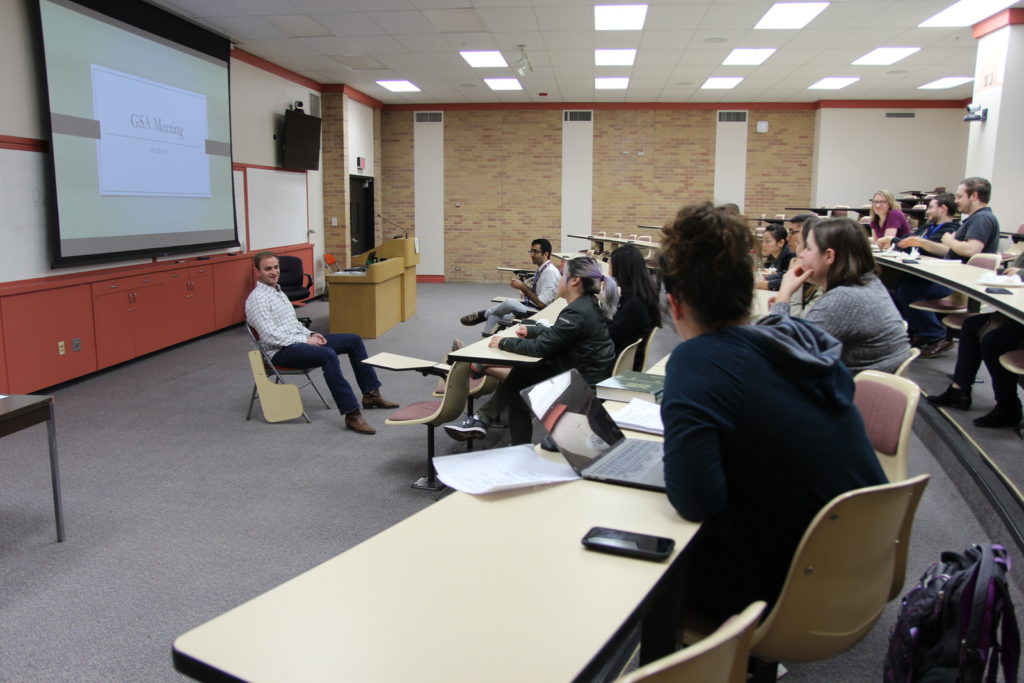Alum Dr. Travis Block: What are Jobs in Industry Like?
 Dr. Travis Block, senior scientist at StemBiosys, Inc. recently spoke to a group of graduate students at the Graduate Student Association’s monthly meeting.
Dr. Travis Block, senior scientist at StemBiosys, Inc. recently spoke to a group of graduate students at the Graduate Student Association’s monthly meeting.
Block, an alumnus of the Biomedical Engineering Ph.D. program graduated in 2017. While as a student, he was active in the Society for Biomaterials, past president of the Graduate Student Association and founder of San Antonio Science, a local non-profit organization.
He explained that his segue into his career was fortuitous because StemBiosys, Inc licensed the patent that resulted from his dissertation project while still a graduate student. After his work was licensed by the company, there was also an opening for a Senior Scientist position which was perfect for him.
Q&A with students
What is hiring like in industry?
“It’s tough to know because, especially with the smaller companies, the hiring practices can be totally different, and much less formal. Many of the jobs don’t even get posted publicly. People will send in their resume and when someone is needed, we tend to look at what we already have on file first.”
If I want to do a Ph.D., should I do a postdoc?
“In my opinion, no, they really don’t care. It’s more about a record of being productive.”
How is industry different than academia?
“In academia, people are excited for weird results but in industry, it is about reproducible results. Like when I read papers from Novartis, I think this is golden, because there is an incentive to make it work there, because everything is about how they can make money.
Is publishing important in industry?
“Publishing isn’t your whole job so you end up publishing less, but you still need to publish typically. Sometimes you may just have to delay a little so that you can apply for a patent first. I am still publishing regularly in my current role”
Is funding different? Do you still apply for grants?
“Funding is different. I still apply for grants, but for projects that are part of our core business model it may not be worth it to wait for grant funding. In industry, time is much more expensive because rent and labor are much more expensive than in academia. So it is important to move quickly.”
How is your job different than what you expected?
“Most of my job is writing. When I finished my Ph.D., I thought my job was to sit there doing bench research like pipetting all day but in reality with a Ph.D., I spent my day designing experiments and evaluating the results while technicians do the wet work. Also, as soon as you get your first promotion, your job is to manage people and it’s a huge part of the job description.”
What can I do now to be prepared for a job in industry?
Go to more industry focused conferences like Cell & Gene Meeting on the Mesa or Tissue Engineering and Regenerative Medicine International Society, or American Society of Clinical Oncology. Secondly, networking is very important. Start talking to people now and ask that person to introduce you to other people.
What should I change about my resume from an academic CV?
The language which I wrote about my projects changed. I emphasized transferrable skills like working with people, timelines and also any experience that I had leading/following because that’s something I learned now that I have experience hiring people. I learned we care more about soft skills. We might think we need someone for a specific project, but the reality is that the person will probably last longer than the project so specific technical skills may not be as important as interpersonal skills and attitude.
What have you learned about managing people?
Everyone has their own way that they like to give and receive respect. It is kind of like the five love languages. If you treat two people the exact same way, they may interpret it very differently. Especially with the amount of introverts in science, it is really important that you communicate frequently and clearly. There’s a learning curve whenever you interact with new people.
